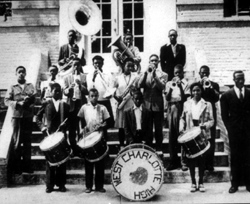 |
|||||||||
Race and Desegregation: West Charlotte High School
Given that federal judge Robert Potter lifted the city's thirty-year-old busing order in the fall of 1999, the Southern Oral History Program's "Listening for a Change" initiative on race and desegregation at West Charlotte High School was particularly well timed. In a series of interviews, project coordinator Pamela Grundy captured the voices of West Charlotte's former students, parents, teachers, and administrators. The oral histories reveal that the story of the school goes much deeper than issues of busing, race relations, and public policy - West Charlotte is an institution that has instilled pride, maturity, and spirit in its graduates, whether black or white. As interviewee Bill Culp, who taught briefly at West Charlotte and then sent four children to the school, explains: "I really think that education is more than just what you learn out of books. It's a lot about what you learn from other people. And in order to have a good education, you have to have experiences from lots of people who are different than you are." One of the most exciting aspects of the project was an exhibit curated by Grundy for the Museum of the New South, Charlotte's highly regarded post-Civil War history museum. The exhibit, "Carrying the Spirit: Voices of Desegregation at West Charlotte High School," gave several thousand teachers, students, and other visitors a chance to explore the historical dimensions of present-day debates over diversity in education. In conjunction with the exhibit, Grundy wrote an opinion piece on the subject that was published in The Charlotte Observer. Pamela Grundy, who lectures at Davidson College, is the author of the oral history You Always Think of Home: A Portrait of Clay County, Alabama and Learning to Win: Sport Education and Social Change in North Carolina, 1880-1970. |
|||||||||
The Southern Oral History Program Center for the Study of the American South Love House and Hutchins Forum 410 East Franklin St., CB# 9127, UNC-CH Chapel Hill, NC 27599-9127 (919) 962-0455 info@sohp.org | |||||||||
